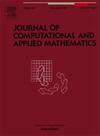Exactly divergence-free ultra-weak discontinuous Galerkin method for Brinkman–Forchheimer equations
IF 2.6
2区 数学
Q1 MATHEMATICS, APPLIED
Journal of Computational and Applied Mathematics
Pub Date : 2025-10-03
DOI:10.1016/j.cam.2025.117124
引用次数: 0
Abstract
This paper presents an exactly divergence-free ultra-weak discontinuous Galerkin (UWDG) method, utilizing -conforming spaces for the Brinkman–Forchheimer equations. We also develop an unconditionally stable first-order time discretization scheme based on the linearized convex-splitting approach by interpreting the Brinkman–Forchheimer equations as an gradient flow in the exactly divergence-free space. It is proven that the fully discrete scheme remains unconditionally stable in both the norm and the energy functional, with corresponding error estimates provided. Furthermore, we employ the IMEX-BDF method with the deferred correction (DC) approach to develop high-order linear semi-implicit schemes. Numerical experiments with various parameter configurations validate the proposed schemes, demonstrating their accuracy, stability, and computational efficiency. These results underscore the robustness and effectiveness of the method in solving the Brinkman–Forchheimer equation.
Brinkman-Forchheimer方程的完全无散度超弱不连续Galerkin方法
针对Brinkman-Forchheimer方程,利用H(div)-符合空间,给出了一种完全无发散的超弱不连续Galerkin方法。通过将Brinkman-Forchheimer方程解释为完全无散度空间中的L2梯度流,提出了一种基于线性化凸分裂方法的无条件稳定一阶时间离散化格式。证明了完全离散格式在L2范数和能量泛函中都是无条件稳定的,并给出了相应的误差估计。此外,我们采用IMEX-BDF方法和延迟校正(DC)方法来开发高阶线性半隐式格式。不同参数配置下的数值实验验证了所提方案的准确性、稳定性和计算效率。这些结果强调了该方法在求解Brinkman-Forchheimer方程中的鲁棒性和有效性。
本文章由计算机程序翻译,如有差异,请以英文原文为准。
求助全文
约1分钟内获得全文
求助全文
来源期刊
CiteScore
5.40
自引率
4.20%
发文量
437
审稿时长
3.0 months
期刊介绍:
The Journal of Computational and Applied Mathematics publishes original papers of high scientific value in all areas of computational and applied mathematics. The main interest of the Journal is in papers that describe and analyze new computational techniques for solving scientific or engineering problems. Also the improved analysis, including the effectiveness and applicability, of existing methods and algorithms is of importance. The computational efficiency (e.g. the convergence, stability, accuracy, ...) should be proved and illustrated by nontrivial numerical examples. Papers describing only variants of existing methods, without adding significant new computational properties are not of interest.
The audience consists of: applied mathematicians, numerical analysts, computational scientists and engineers.

 求助内容:
求助内容: 应助结果提醒方式:
应助结果提醒方式:


